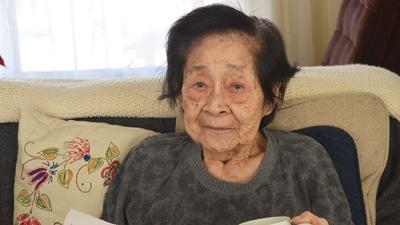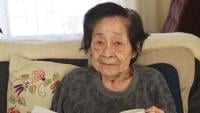Jefferson Countian Yukiko Keathley has packed a lot of living into her century on this earth.
She marked her 100th birthday on Dec. 16 with a small family gathering at her home in Pevely, where she has lived for the past 55 years.
“Everybody just calls her Yuki, except me. I call her Miss Yuki,” said Dana LaMure, her caregiver of more than four years.
While the second half of her first 100 years is noteworthy enough – she raised two successful twin sons, Tom and Lee, and bowled and golfed and frequented a gym into her mid-90s – it’s the first half of Yuki’s life that is truly exceptional.
Born in Walnut Creek, Calif., the daughter of two Japanese immigrants, Shoji and Koto Kato, Yuki was in her early 20s when she and many of her family members, along with more than 8,000 American citizens of Japanese descent, were forcibly relocated into internment camps during World War II.
After her release from the camp in Arkansas after the war, Yuki made her way to St. Louis, where she attended secretarial school.
She was hired by the powerful Teamsters Union Local 688, which was led by the progressive Harold Gibbons, who hired women as attorneys and organizers long before the women’s liberation movement.
In the postwar years, her son, Tom, noted, “the war was still fresh in many minds, and a Japanese woman working in the Teamsters Union drew some criticism, although her exceptional competence easily overcame any residual prejudice.”
So much so that she was spirited away to Washington, D.C., to serve as the secretary of Gibbons’ boss, Jimmy Hoffa, the infamous national president of the Teamsters Union.
During that time, Yuki met Sherman Ferguson “Ferg” Keathley, a union negotiator who served in the U.S. Air Force during World War II, and the two married.
She was still working for Hoffa when Tom and Lee were born in 1962. Yuki was 40 at the time – an advanced age back then for childbirth.
“Back in the day, she was pretty old to be having twins,” Tom said. “I think back then, they knocked her out (anesthetized her) to give birth. She woke up, and there we were.”
About a year later, Ferg was offered a chance to manage the Local 688 Health and Medical Camp in Pevely, so the family uprooted to Jefferson County.
Ferg died in March 1994, but Yuki remained active.
The secret to her long life
During a recent visit with Yuki, she was asked her secret to living a long life.
“Secret? I have no secret,” she replied, then scrunched up her face in what LaMure described as her trademark look.
LaMure offered Yuki some possible answers.
“I think it’s because you’ve been so active, and you drink a lot of water,” LaMure told Yuki. “Also, I think it’s because you haven’t had a lot of stress in your life.”
Yuki shrugged, then nodded sagely.
“Until she was 96 or 97, she was still pretty sharp,” Lee said. “Over the last two or three years, her short-term memory has started to decline, and she realizes it. She gets very frustrated. It’s sad.”
However, Tom said his mother remains positive.
“I think the best thing to say is that she’s still as happy as she ever was and she brags about her two children more than anyone wants to hear about,” he said.
Lee said his mother always has had an optimistic disposition.
“Even though she was interned and discriminated against because her family was from Asia, if she had any bitterness in her heart, she never has shown it to us,” he said.
Asked how she has kept such a positive outlook, Yuki again relied on her caregiver to verbalize her thoughts.
“I think it’s because you’ve been so blessed,” LaMure told her. “You had a great husband and two fantastic sons. What a family is supposed to be, they have been.”
Yuki again nodded in agreement.
The early years
In her youth, Yuki attended American schools in the day and a Japanese school at night, her sons said.
“She was fluent in both Japanese and English,” Tom said. “You would never know she was Japanese by just talking with her.”
He said his mother played the shamisen, a traditional Japanese stringed musical instrument, and sometimes wore a kimono. She also played on her church basketball team, the Busy Bees, in her teens.
“That had to have been a little comical, a 5-foot-tall Japanese woman playing basketball,” Tom said. “But Mom always has been athletic. She coached basketball teams in the internment camp.”
Both sons said their mother spoke very little about her three years in the Rowher Japanese American Relocation Center in Arkansas. Other accounts paint bleak pictures of the camps, which had few amenities and little privacy.
“We didn’t know about that at all for the longest time,” Lee said. “Her grandparents ended up losing their restaurant when they were interned. But she has never been bitter. I think the only reason we ever found out about it was in 1988, when the Reagan Administration was paying $20,000 to every living person who had interned. That’s what really created the awareness for us.”
Tom said they also have scant details about what happened to Yuki after her release.
“We do know she went to secretarial school in St. Louis and ended up working for the Teamsters and she was such a great secretary that some of the Teamsters officials wanted her to work for them,” he said. “Then she was in D.C. working for Jimmy Hoffa.”
As the head of the Teamsters – which at its peak had 2.3 million members – Hoffa was involved in organized crime, and after serving time in prison, he disappeared in 1975. His body has never been found and he is believed to have been murdered by the Mafia.
Gordon Burnside, in his 2018 book, “Harold Gibbons: St. Louis Teamsters Leader and Warrior Against Jim Crow,” shed some light on Yuki’s employment.
Burnside wrote that for years Yuki was “the keeper of Gibbons’ secrets” and then when Yuki joined Hoffa in D.C., she assumed the same role.
“Hoffa was very good to me,” Yuki told Burnside. “He let me have the run of the place. Of course, I never asked questions. I never repeated what I saw.”
Yuki told Burnside she liked Hoffa. While Hoffa has the reputation of being tough on subordinates, “he was the nicest guy to me,” Yuki is quoted as saying in the book. “He wouldn’t let anyone cuss in front of me.”
‘Your mom’s your mom’
Both Tom and Lee credited their parents with instilling in them a strong work ethic.
“A lot of what Mom told us had to do with working hard,” Tom said. “She related a lot of that Asian work ethic about if you’re willing to work to do things that are hard, you will realize positive things. I think both of our parents really burned a strong work ethic into us. I think it’s paid off.”
Both are retired after serving in upper management – Tom for AT&T and Lee for the Anheuser-Busch Cos.
Their wives and two of their four children attended Yuki’s birthday party. Yuki also has two great-grandchildren.
Lee said family life around the
Keathley household was pretty typical for most Jefferson County families.
“It seemed pretty normal to us, other than sometimes having different kinds of food,” he said. “Most kids growing up that we knew didn’t eat Japanese food. Not everybody’s mom spoke Japanese when she spoke to her relatives on the phone.”
Tom agreed.
“I’m guessing only one person within 100 miles of us spoke Japanese, and that was Mom,” he said. “At least, we never knew anyone who did, certainly not anyone in Jefferson County. I’d characterize her as a fairly strict mom, but very affectionate. But both of our parents were really special. I don’t think we could have had better parents.”
Both men say they gave little thought to their mother’s colorful past when they were growing up.
“I don’t think I got it until I went away to college, how exceptional she really is,” Lee said.
“We really didn’t get that her history was so special at the time,” Tom added. “Perhaps in my late teen years, I did.
“But in the end,” he said, “your mom’s your mom.”




